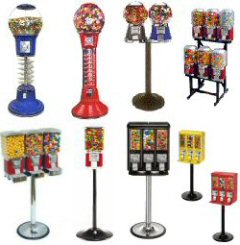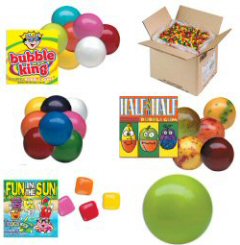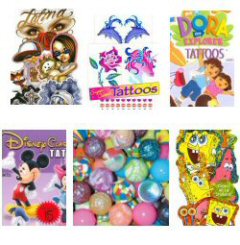Running a Successful Vending Machine Business
The perfect vending business is one where life is gentle and the income is high. It is one with few complaints and no demands for instant response. It is one where the return on investment is high, and you get maximum dollars out of each machine at each service.
Bulk vending is the only vending business that has these wonderful characteristics. Other kinds of vending require being available for frequent 24-hour repair calls, the constant moving of expensive heavy equipment, and very frequent refill service, due not to being sold out, but because of the short shelf life of the products. In the bulk candy and gum business service calls are rare and can almost always be easily taken care of at the next regularly scheduled call.
Bulk machines have only a tiny percentage of the coin problems encountered in other machines and the pricing can easily be changed. Bulk machines are relatively inexpensive, require no special equipment and are very easy to move and install.
Last, but most important, bulk vending machine products stay fresh until it is time to service the machine – because it is full of money! This means you get the maximum possible income per service call.
Add in bulk vending’s much higher profit margin and you have the highest return on investment possible from a vending machine. In other words, if two different people each invested $75,000 in vending machines the one who invested in large vending machines will work harder, have more service problems and a lot more maintenance.
In contrast, the person who invested in the vending machines will have a much quieter phone, a lot less stress, and a much greater net profit.
Just buying vending machines does not equal income-producing power. Income producing power comes from getting your machines on location and then keeping your machines on location. Businesses fail, change ownership, move, merge, remodel, etc. You will always want new customers. Find new customers by going door to door through local businesses, talking to decision makers who are willing to have vending machines.
Although many operators use locating services, be cautious of dependence on locators for the success of your business. A locator can help you get machines placed, but whoever fills the machines needs to know how to acquire replacement locations. Otherwise, your machines may eventually end up in storage.
Some ways to find good locators are to ask vending suppliers, look for ads, or search on the Internet. Ask for references and check them out. Good locators stay booked up weeks in advance so be prepared to work with their schedule. Be advised, when working with a locator you need to understand the reality of the locator’s market place. Good locators have many vendors wanting to buy their time. Consequently, they only work with the vendors they like.
Finally, find the time to spend at least one day working with the locator as part of your education to learn how locating is done. You will find getting your own new customers is simple work that anyone can do.
Getting new customers is simple. You go door to door to every business on a street. Make your visiting fun! You will be most effective if you take a 15-minute break every hour. Make your first call at 9AM and your last call at 5PM. Take an hour for lunch, from 12:30-1:30. Take time to enjoy meeting people and looking at all the fun stuff they sell. Enjoy yourself. Some of the people you meet will be having bad days — don’t take their rudeness to heart. Remember. you get what you ask for, so ask for what you want! First, you want to speak with the owner or manager. Second, you want permission to put in a machine.The secret words are: “Will it be alright for me to place a gumball/candy machine here” They will say “OK,” “No,” or ask a question. Over the long haul you will get a “Yes” every 15-25 doors.
When you are asked to pick up a machine never bring it back to storage. Carry it to the neighboring businesses until you find it a new home. If they say “No room”, ask, “What will I have to do to get you to want to find room?” If they say, “We already have a machine,” ask, “Would you like more variety?” If they say ‘We had one, but it didn’t work out,” then you ask, “What was the issue?”
Ask lots of questions and then decide what incentive to offer. Some examples are: a 30-day trial, revenue sharing, or helping a charity. The key to making the sale is to ask mostly questions and never stop visiting potential customers. As you work, you will hear a vast number of “No’s,” but the occasional “Yes” will produce income for years.



